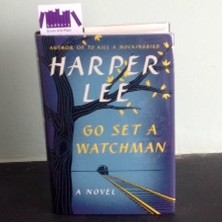Inspiring Older Readers
 posted on 30 Aug 2015
posted on 30 Aug 2015
Go set a Watchman by Harper Lee
It has been difficult not to look at any of the countless reviews of this book so that I could read it with a fresh eye. All the hype prior to its publication was also off putting especially as Harper Lee had to be persuaded to have it published years after she discarded it. There is no doubt that 'To Kill a Mockingbird' is a wonderful piece of writing and that the underlying themes of decency and justice are just as meaningful as ever. Although I deliberately avoided reviews, I have been dimly aware that the long awaited sequel ( that was actually written before TKM) was a huge disappointment for many readers in terms of form and the fall from grace of the charismatic Atticus Finch
Because of all this I must admit that I approached it with some trepidation. Not only was I prepared for a literary hero to turn out to be a shallow charlatan, but also that I might be bored and unimpressed with the style. It was as if I was preparing to do some homework that I then had to write up ( which I suppose I am doing now). I was immediately happy with the writing which was pleasurable to read which soon transported me into the sleepy little Southern town carefully led by a now twenty six year old Scout who was returning home for one of her yearly visits. No longer the unconventional tomboy that we came to know and love in the earlier book, she has grown up to be outspoken but prepared to make diplomatic compromises in terms of how she presents herself when she goes home to visit her family. The wider political background is hugely significant as the novel is set in 1960s America with the growing demand for Negro rights and equality that threaten the cosy stability of small towns like Maycomb, Alabama. There is a volatile atmosphere brewing between the White and Coloured communities that sharply reflects this. Other changes have happened, Scout is usually known by her full name, Jeanne Marie, her elder brother Jem has recently died young, her father and aunt have moved away from her childhood home to the other side of town and Atticus is increasingly disabled by rheumatoid arthritis.
Some things stay the same however as she is still courted by Henry, now a junior in her father's legal practice who seems to be patiently for her to get her city ways out of her system so that she will settle down and marry him. Her female peers have mostly done this already and she is appalled by their narrow world that is focussed on gossip, general old fashioned home making, pleasing husbands and having babies. She is prepared to put up with all this for a short holiday period but then witnesses Atticus and Henry appearing to condone the need for racial segregation at a public meeting where a great deal of poisonous rabble rousing occurs that is seen to be for the good of everyone concerned. Her reaction to this is visceral (and probably chimes with most readers) as she is physically sick when she realises that all her beliefs about the decency of those she loved and admired have been shattered.
Perhaps the story should have ended at this point with her packing her bags and fleeing back to her home in New York. Instead she struggles to make sense of what she has seen, confronts her father who comes out with explicitly racist propaganda ( very difficult to read coming from him). She is distraught and tries to puzzle the reasons for his views by consulting with his brother who comes up with an unconvincing explanation that didn't ring true for me. His argument was that the Civil Rights movement was happening much too quickly and that poor white Southern communities were too ingrained in their attitudes to change that quickly. He explains that they were all on the side of justice, but within reason. As I was reading the latter part of the book, I kept urging her to abandon them all with their ridiculous views - she certainly challenges them and expresses her outrage but in the end she caved in and sort of forgave them. This left me feeling astounded because I just don't believe she would have behaved in this way. So, I'm not so much disappointed in Atticus as I am in her and actually regret reading the book. The writing style was not a problem for me but Re reading TKM in the future will inevitably be tainted now, which is a shame.
Karen Argent
August 2015